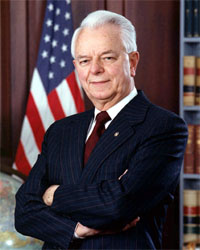Appointment of Byrd replacement bodes well for DADT repeal

Robert Byrd
The immediate replacement for U.S. Senator Robert Byrd (D-W. Va.), who died June 28, will most likely be chosen by the governor, not by a special election—and that is good news for the chances of repealing the “Don’t Ask, Don’t Tell” (DADT) ban on lesbian and gay servicemembers.
Byrd’s death came after West Virginia’s primary elections were held this year, and state law requires that candidates in special elections to fill vacancies must file during the regular primary filing period, which has already passed. The next regular primary and general elections will not come again until 2012.
West Virginia Secretary of State Natalie Tennant issued a statement the day of Byrd’s death, confirming that there can be no special election until 2012. At that point, there will be two elections, one for the remaining five or so weeks of Byrd’s unexpired term, and one for the next full term.
That means Democratic Gov. Joe Manchin will get to appoint a senator to serve Sen. Byrd’s term until that election.
Byrd had provided critical support in moving forward a measure to repeal DADT. He worked with Senate and House leadership on a provision that would give Congress an additional 60 days to review the proposed policy changes, even after the president, the Secretary of Defense, and the Chairman of the Joint Chiefs certify them.
That language was included in an amendment to the Defense Authorization bill that passed the House and the Senate Armed Services Committee (of which Byrd was a member) at the end of May. The full Senate is set to take it up when it returns from recess July 12.
With the vote likely to be close, the focus now is on who Gov. Manchin will choose to replace Byrd. The most frequently mentioned names in the media have been Nick Casey, the former chair of the state Democratic Party, who has just accepted a federal judgeship, and the new party chair, Larry Puccio, the governor’s former chief of staff.
Other names include Senate Pres. Earl Ray Tomblin, Carte Goodwin, a former counsel to the governor, and former state Supreme Court Justice Richard Neely.
No matter who is chosen, most sources see the person as a placeholder for Gov. Manchin, who has long been viewed as a candidate to replace Byrd. Manchin has said that he would not appoint himself to the position, however.
Stephen Skinner, chair of the board of Fairness West Virginia, the state’s leading LGBT advocacy group, said he would expect both Casey and Puccio to follow Byrd’s lead on DADT and can’t imagine that any of the other possible appointees would differ. He said his organization has existing relationships with all of the likely choices, and “we’ll immediately reach out to whomever is chosen.”
The LGBT-related record of the possible choices is slim. Goodwin, as counsel to Gov. Manchin, and Tomblin, as Senate president, backed the governor in rejecting a 2008 attempt by the Family Policy Council of West Virginia to push through a state constitutional amendment that sought to limit marriage to one man and one woman. They pointed out that current state law already does so.
Fox News reported June 29, however, that state Republicans will continue to fight for a special election this coming November.
If they are successful, the likely Republican contender would be U.S. Rep. Shelley Moore Capito. She is the only Republican in the state’s Congressional delegation—but is seen as a moderate—and the state voted for Republican candidates in the last three presidential elections.
Capito is no supporter of LGBT rights, however. She voted against the Employment Nondiscrimination Act in 2007 and against a 2007 standalone version of an LGBT-inclusive hate crimes act. (She ultimately voted for the defense appropriations bill to which the Matthew Shepard and James Byrd, Jr. Hate Crimes Prevention Act was successfully attached.) And, in 2006, she voted for a failed House resolution that would have proposed a constitutional amendment defining marriage in the U.S. as the union of a man and a woman.
Most critically, she voted against the Defense Authorization amendment to repeal DADT that Sen. Byrd had worked to pass.


Leave a Reply